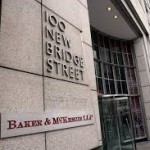Mike Lynch’s Invoke Aims to Replace M&A Lawyers With Robots

-
Former Autonomy CEO backs startup using AI for due diligence
-
Move comes a week after HP sold former Autonomy assets
Could the armies of lawyers needed to close billion-dollar deals soon be a thing of the past?
That’s what Invoke Capital, the London-based venture firm run by former Autonomy Plc Chief Executive Officer Mike Lynch, is betting with its latest project financing. Invoke said Wednesday that it’s making an investment in Luminance, a U.K. startup using artificial intelligence to process legal documents and automate due diligence in mergers and acquisitions. While the amount of the investment was not disclosed, Lynch said in an interview that the figure was “in the low millions.”
Luminance says its software can read and understand hundreds of pages of legal documents a minute, enabling lawyers to carry out due diligence far faster than previously. Sally Wokes, a partner at Slaughter and May who works on large company mergers and who helped trial Luminance, said the firm found that completing due diligence while using the system was as much as 50 percent faster than doing the same document reviews using only humans.
“Luminance has been trained to think like a lawyer,” the company’s Chief Executive Officer Emily Foges, a veteran of senior executive roles at Betfair, BT and Equifax, said in a statement. The software can highlight important information without needing to be told what specifically to look for, according to Foges. Rather than employing attorneys to scan through thousands of documents to identify possible issues, these lawyers can now devote their time to analyzing the software’s findings and negotiating deal terms, Foges said.
Founded by a team that includes mathematicians and machine learning experts from the University of Cambridge, as well as legal and deal-making experts, Luminance has been incubated by Invoke over the past year and developed with help from the London-based international law firm Slaughter and May. The company, which employs a technology team of 10 people in Cambridge, England, and an equal number of sales and marketing staff in London, launched its product more widely Wednesday.
Both Foges and Wokes said that they did not envision the system replacing lawyers. Instead, Wokes said, the system enabled lawyers to work faster. It also meant, she said, that lawyers could spend time on tasks that are both more intellectually-demanding and more intellectually-rewarding, rather than simply reading and categorizing reams of documents. “This enables lawyers to manage the process much more efficiently and that they enjoy the process of diligence in a way that they didn’t necessarily previously,” Wokes said.
Steve Cooke, senior partner at Slaughter and May, said “legal due diligence is ripe for the revolution that artificial intelligence offers.” Wokes said Slaughter and May saw Luminance as a way to stay competitive in an environment where law firms are increasingly looking to use technology to augment their processes.
Luminance is hardly the only company to be developing AI for reading and analyzing complex legal documents. RAVN Systems, another U.K. based technology company, has developed a competing system. IBM’s Watson cognitive computing platform has also been piloting software to analyze legal documents in bankruptcy cases. U.K. law firm Riverview Law has developed its own digital legal assistant, called KIM, that it’s now selling to others, and Pinsent Masons has developed a program to read and analyze clauses in loan agreements.
But Lynch said Luminance has “a technological advantage that outstrips its rivals.” He said it is the only system he has seen that can read natural language and actually understand it, using it to categorize documents, rather than just searching text to match key words or standard clauses. “Those other systems cannot do due diligence,” Lynch said, because they can not cope with reviewing different kinds of legal documents — everything from employment contracts to sales contracts to real estate deeds — that might come up in an acquisition. He also said Luminance could review contracts to see if they were compliant with new laws or regulations.
Luminance’s focus on due diligence surrounding mergers and acquisitions may raise a few eyebrows given that Hewlett-Packard’s $10.3 billion acquisition of Autonomy, announced in August 2011, went badly wrong: Hewlett Packard later claimed that Autonomy had improperly booked revenue and wrote off almost $9 billion of the acquisition’s value. Subsequently HP sued Lynch and ex-Autonomy chief financial officer Sushovan Hussain for $5.1 billion. Lynch has denied any wrongdoing andcounter sued HP for 100 million pounds ($131 million). The U.K. Serious Fraud Office investigated Autonomy’s accounting but concluded in January 2015 that there was insufficient evidence to prosecute. The U.S. Justice Department and Securities and Exchange Commission continue to investigate aspects of the deal.
Lynch said that his experience with HP-Autonomy deal was not the reason he was interested in backing Luminance. “Are you asking if I think a computer is smarter than Meg Whitman?” Lynch joked, referring to the HP CEO. “I know you would love that answer but the reality as you know is that in public company transactions in the U.K., actually the due diligence is relatively small,” he said. “The experience is much more in private company M&A transactions where there is large amounts of due diligence that has to happen because you don’t have the public information.”
Last week, Hewlett Packard Enterprise Co., one of two companies split from Hewlett-Packard Co., sold the division that includes the assets it purchased from Autonomy to the U.K. software firm Micro Focus International Plc for $8.8 billion.
Invoke, which says it has access to $1 billion in assets, has previously backed three other Cambridge, England-based companies exploring applications of machine learning. These include the cybersecurity firm Darktrace, whose executive team counts a number of Autonomy alumni, a genomics startup called Sophia Genetics, and Neurence, which is working on computer vision and object-recognition.
Source: Bloomberg




























